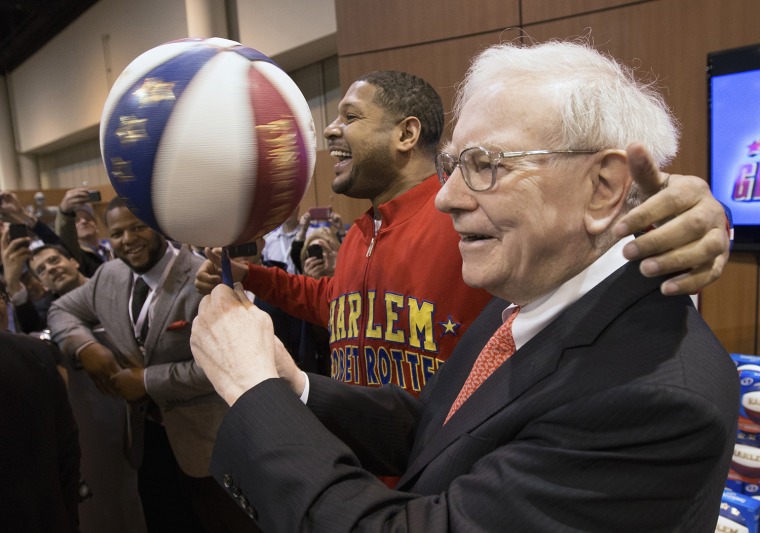The basketball fan most likely to take home the big bucks in Warren Buffett’s billion-dollar "March Madness" bracket challenge is ... Warren Buffett.
It may have sounded risky when the billionaire investor announced on Tuesday that his Berkshire Hathaway venture would pay out $1 billion if someone wins Quicken Loans' "Billion-Dollar Bracket Challenge." The challenge consists of picking the winner in all 63 of the games covered by the standard bracket for March's NCAA basketball tournament. A successful contestant could choose between a $500 million lump-sum payment and 40 annual pretax payments of $25 million, amounting to one ... billion ... dollars!
But it's virtually certain that Berkshire Hathaway will instead pocket Quicken Loans' insurance premium. Although Buffett isn't saying how much Quicken is paying him to back up the publicity stunt, it's thought to be at least several million dollars.
What are the odds?
A billion is a pretty big number, but the numbers associated with the odds of getting every game right are even bigger. Let's start with the number of possible permutations: That's 2 to the 63rd power, or 9.2 quintillion. So if you went with random guesses or coin flips, your chance of winning would be 1 in 9.2 quintillion — and a quintillion is a billion times bigger than a billion.
A savvy sports prognosticator should be able to fill out a bracket far better than a coin-flipper — and that would bring down the odds significantly. How much? Mathematicians disagree on that point. DePaul Professor Jeff Bergen goes with 1 in 128 billion. At least one of the mathematicians surveyed by The Wall Street Journal came up with a much more favorable estimate of 1 in 150 million.
For what it's worth, the Journal quoted Buffett as saying that "Einstein himself could not figure out the odds." (Buffett took a stab at it anyway, but he's keeping the estimate to himself.)
Buffett and Quicken are hedging their bets in a couple of additional ways. First, they're limiting the maximum number of entries to 10 million registrants, and one entry per household. What's more, the Los Angeles Times says Buffett would probably offer a buyout to anyone who came into the Final Four with a perfect bracket. It sounds like a hopped-up version of "Deal or No Deal": Would you turn down $10 million to gamble on those last three games?
Even if no one comes up with a perfect bracket, Quicken is on the hook for 20 prizes of $100,000 each, to be paid for the brackets that come closest to the mark. But those payouts could well be dwarfed by the premium that Buffett and Berkshire Hathaway are getting.
Hole-in-one insurance
Berkshire Hathaway is basically providing Quicken Loans with hole-in-one insurance — a kind of policy that's so named because golf courses buy them to back up the big payoffs they publicize for a hole-in-one shot.
Having a perfect NCAA tournament bracket has been compared to making four hole-in-one golf shots in a row. Of course, there’s always a chance that the long shot will actually happen — as one insurance company discovered when it set up a hole-in-one-style policy for the Ansari X Prize for private spaceflight.
The insurer accepted a premium of more than $1 million from the Ansari family, with the understanding that it would pocket the money if no one won the X Prize by the end of 2004. If one of the rocket teams actually flew into space by the deadline, the insurance company would be responsible for providing the $10 million purse. In October 2004, the SpaceShipOne rocket plane won the competition — and the insurer lost millions.
Warren Buffett is the world's fourth-richest man, with an estimated net worth of nearly $60 billion. He's also said to be a heck of card player. That combination may make him uniquely suited for this kind of high-stakes wager. Registration for the billion-dollar challenge opens on March 3, but we'll have to wait until well after the NCAA tournament begins to find out whether the wager is pure March Madness ... or a marketing masterstroke.
Alan Boyle is NBCNews.com's science editor. Connect with the Cosmic Log community by "liking" the NBC News Science Facebook page, following @b0yle on Twitter and adding +Alan Boyle to your Google+ circles. You can also check out "The Case for Pluto," my book about the controversial dwarf planet and the search for new worlds.
